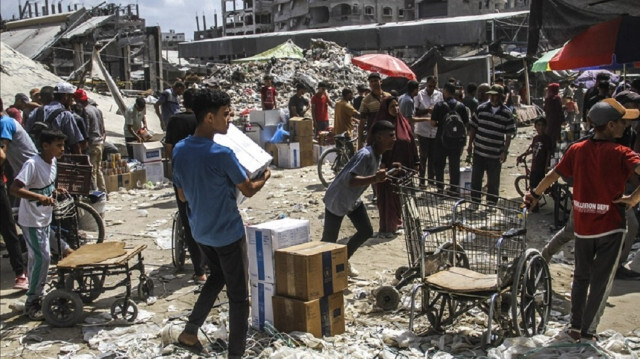
US, Europe refrain from cease-fire calls amid humanitarian crisis
Western nations continue to provide strong political and military support to Israel, despite a genocide campaign, alongside international calls for a cease-fire, one year after the Israeli-Palestinian conflict in the Gaza Strip escalated.
The US, UK, Germany, France and Italy, among other Western countries, pledged support for Israel's "efforts to defend itself and its people" following an attack by the Palestinian resistance group, Hamas, on Oct. 7, 2023. Those nations, particularly the US and the UK, have consistently affirmed Israel's "right to self-defense" and promised to provide all possible assistance.
The US vetoed a UN Security Council resolution on Oct. 18 that urged for a "humanitarian pause" in Gaza to allow aid delivery. Similarly, on Oct. 25, separate draft resolutions presented by the US and Russia on developments in the conflict were mutually vetoed.
The West also refrained from condemning Israel's attacks on Gaza and refused to call a clear "cease-fire" for an extended period. The US vetoed a Security Council resolution on Dec. 8 that demanded an immediate humanitarian cease-fire in Gaza.
At a UN General Assembly special emergency session on Palestine on Dec. 13, a draft resolution presented by Egypt and co-sponsored by nearly 100 countries, including Türkiye, which called for an immediate humanitarian cease-fire, was adopted in a 153 - 10 vote. The US, Austria and the Czech Republic were among the countries voting against.
It was not until March 25 that the Security Council adopted a resolution demanding an immediate cease-fire during the Muslim holy month of Ramadan with the intention of leading to a permanent and sustainable cease-fire. The resolution, prepared by temporary members of the Council, passed with 14 "yes" votes and an abstention from the US.
- Support for Israel in international arena
US Secretary of State Antony Blinken has made 10 Middle East tours since Oct. 7, visiting Israel nine times along with other regional countries.
Israeli Prime Minister Benjamin Netanyahu addressed the US Congress in July. Despite protests and condemnations, many US lawmakers gave Netanyahu multiple standing ovations during his 52-minute speech.
German Chancellor Olaf Scholz described Israel as a democratic state with humanitarian principles and said he believes the Israeli army will comply with the rules of international law in everything it does. He also said Germany will immediately examine and fulfill requests for support from Israel.
European Commission President Ursula von der Leyen pledged "unconditional support" for Israel. She was among the first leaders to visit Israel in a show of "support" after Oct. 7, consistently emphasizing Israel's "right to self-defense" despite civilian casualties. Von Der Leyen has become the target of protests in European Parliament and on the streets, due to her stance.
Western countries continue to refrain from condemning Israel, as they continue to reaffirm their commitment to support Tel Aviv in any way possible at the slightest attack on Israel.
- Intense military support
Western military support for Israel has remained substantial since the start of the current war.
The US provided 70.2% of Israel's conventional weapons imports from 2011-2020, followed by Germany at 23.9% and Italy with 5.9%, according to the Stockholm International Peace Research Institute (SIPRI). Weapons supplies to Israel continued after Oct. 7.
In April, the American Congress approved a $95 billion foreign military aid package, allocating $17 billion to Israel.
An investigation by the Haaretz newspaper in Israel found that 173 military and civilian cargo flights from the US and American military bases transported weapons and ammunition to Israel from Oct. 7 - July 2024.
Moreover, on Sept. 26, the Israeli Defense Ministry announced Director-General Eyal Zamir signed an agreement in Washington for Tel Aviv to receive a $8.7 billion American war aid package.
European countries' arms exports to Israel have reached billions of euros in the last decade. Between 2014 and 2022, the value of export licenses granted to Israel from EU countries was approximately €6.3 billion ($6.91 billion).
The German government approved at least €1.4 billion ($1.5 billion) worth of arms sales to Israel between 2015 and 2020, according to the database of the Campaign Against Arms Trade (CAAT), a group working to eliminate international arms sales. During that period, the UK exported €426 million in military equipment to Israel, including components for fighter jets, missiles, tanks, light weapons and ammunition.
Germany increased arms sales to Israel tenfold in 2023 compared to the previous year, delivering weapons worth €326.5 million. Berlin approved 185 additional export license applications for arms supplies from Israel in the weeks following Oct. 7.
The UK has been selling military equipment to Israel since 1967. In the last 10 years, the scale of military equipment and arms trade from the UK to Israel has reached £495 million ($650 million), according to CAAT data.
Italy, one of Israel's largest suppliers in Europe, made sales to Israel in the last quarter of 2023 despite the government's "assurance to prevent arms sales under laws prohibiting exports to countries that violate human rights."
France sends parts used in defense equipment to Israel, including those used for the Iron Dome defense system. Civil society organizations have sued France to stop arms sales to Israel.
Hungary and Sweden also signed arms production and sales agreements with Israel in 2023.
As Israel has killed more than 41,800 victims in Gaza, and counting, and is responsible for injuries to 96,844, and counting, Western nations maintain their strong support for Israel, raising questions about the humanitarian concerns in the conflict.

